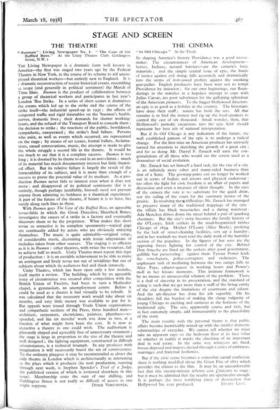THE CINEMA
" In Old Chicago." At the Tivoli IN shaping America's history Providence was a good movie- maker. The circumstances of American development— horses, Indians, natural barriers—are the camera's basic materials ; and the simple central issue of epic, the battle of justice against evil doing, falls accurately and dramatically into the terms of iron-jawed probity against the sneaking gun-puller. English producers have been wise not to tempt Providence by imitation ; for our own beginnings, our floun- derings in the marshes in a hopeless attempt to cope with Julius Caesar, are poor substitutes for the galloping splendour of the American pioneers. To the bigger Hollywood directors. an epic is as good as a holiday in the country. The historians have done their stuff ; nature has built the sets. All that remains is to find the money and rig up the loud-speakers to control the cast of six thousand. Small wonder, then, that Hollywood's periodic excursions into the epic field should represent her best job of national interpretation.
But if In Old Chicago is any indication of the future, the well established pattern of the epic is to undergo a radical change. For the first time an American producer has seriously turned his attention to sketching the growth of a great city ; and for so doing Mr. Darryl F. Zanuck will earn the con- gratulations of all those who would see the screen used as a dramatiser of social evolution.
Mr. Zanuck has set himself a hard task, for the rise of a city is an infinitely more sober and many-sided business than that of a State. The growing-pains can no longer be worked out in terms of bullets and arrows and physical endeavour : too often the fight for civic freedom is an affair of papers and discussion and even a measure of silent thought. In the eyes of the camera the vote is no substitute for the quick draw, nor the ruling of the court for the summary justice of the prairie. In resolving the difficulties Mr. Zanuck has managed to preserve many of the traditional trappings of the epic the villain has black moustaches and a daring waistcoat Ada Mencken drives down the street behind a pair of spanking chestnuts. But the city's story becomes the family history of the O'Learys, Irish settlers in the mud-bespattered timber Chicago of 1854. Mother O'Leary (Alice Brady), profiting by the lack of street-cleaning facilities, sets up a laundry ; and in her washtub we must read the daily work of the humbler section of the populace. In the figures of her sons arc the opposing forces fighting for control of the city. Behind Don Ameche are lined up the seekers after good government, gullible but persevering : against them Tyrone Power leads the vote-buyers, police-corrupters and racketeers. The unpleasant task of mediating between the two camps falls to Alice Faye, cabaret-queen in working hours and Power's moll in her leisure moments. This intimate framework is by no means an unsuccessful solution of the problem. There is a deal of sincerity in its presentation, and the standard of acting is such that we get more than a sniff of the living entity of the city despite the limitations of courtroom and saloon. And the art-director has done his job superbly. On his shoulders fell the burden of making the cheap vulgarity of young Chicago as exciting and ominous as the horizons of the traditional epic. The sets, apparently coarse and rich, but in fact extremely simple, add immeasurably to the plausibility of the story.
The main trouble with the personal theme is that public affairs become inextricably mixed up with the smaller domestic relationships of everyday. We cannot tell whether we must take an apparent rape on the bedroom floor at its face value or whether in reality it marks the clinching of an important deal in real estate. In the same way witnesses are fixed, bosses deposed and mayors elected through a series of embraces: marriages and fraternal bonhomies.
But if the civic scene becomes a somewhat carnal confusion. there is nothing muddled about the Great Firc of 1871 which provides the climax to the film. It may be an uncomfortable fact that this twenty-minute inferno cost kzoopoo to stage ; but it must be admitted that the results are spectacular enough. It is perhaps the most terrifying piece of destruction that
Hollywood has ever produced. STUART Lecc.














































 Previous page
Previous page